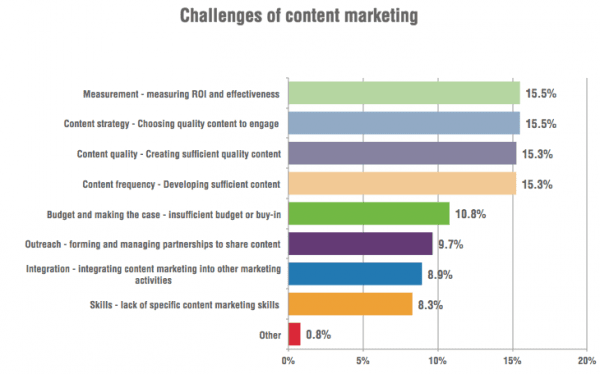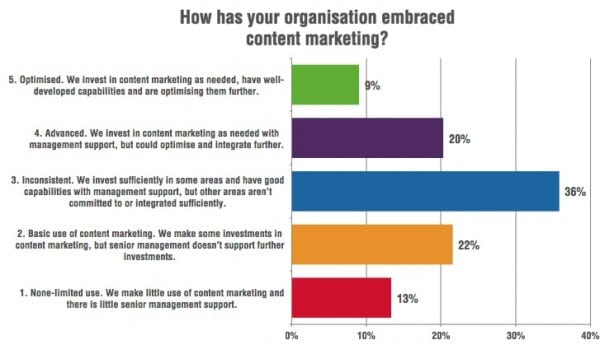Recommendations on improving your content marketing capabilities
In our recent Smart Insights - Hubspot research on Managing Content Marketing, we asked five industry experts for their views on how content marketing can be successfully managed. Here they go into more detail of approaches to improve the effectiveness of content marketing.
You can learn more ideas on how to better manage content marketing in this free webinar from Dave Chaffey showing examples and 10 techniques and examples to make content marketing more effective (recording available).
The challenges of managing content marketing
The research showed that there were a common set of challenges of managing content marketing that companies need to manage.

We can see there are common challenges of content quality, content frequency and measurement which were rated as significant challenges. Of the other challenges mentioned such as challenges, budget, making the case and skills were less significant, suggesting that many organisations have been successful in making the case for investment and identifying budget and resource.
So, what approaches are needed to overcome these challenges? Here's what our panel of experts said.
Stephen Bateman, Content Marketing Strategist and Consultant at Concentric Dots, advises companies to 'start planning, and stop feeling like you’ve got to get your next piece out.'
He says that doing more of the same won’t produce better results. Instead write down what you want consumers of your content to do. Then, and only then, list the content ideas and content pieces that will help you achieve your goal. This small, yet vital modification: turning your content marketing process on its head, will vastly improve your inbound marketing performance.
According to the research, 'Developing a content strategy is top of the list for 2014'. (56% of European marketers don’t have any kind of defined strategy in place, and 26% of European marketers rated strategy as their top priority for content marketing in 2014.'
Daniel Rowles from Target Internet recommends focusing on the challenge of managing the quality of the content, saying that 'it's clear that organisations not only need to look at producing more content to improve their inbound marketing, but they also need to look at producing better quality content and managing it more effectively.'
Daniel adds that, as more and more organisations adopt a content marketing strategy, the volumes of free content available will continue to increase and standing out from the crowd will become increasingly challenging.
How can Google help?
Daniel explains that Google has also made clear changes to their algorithm (see his briefing on the latest algorithm changes) that try and differentiate high quality content from that which offers little original value to the web audience. The need for high quality content that is effectively distributed, managed and tracked is essential.
'The words on the page that help Google identify the relevance of our sites, but also the links and social signals that are needed to demonstrate value and trust. If we create great content people will link to it and talk about it, and that's exactly what we need to differentiate ourselves and achieve great search results', according to Daniel.
'Content marketing can work at a number of different stages of the sales funnel, but one of its most important abilities is to help achieve high search rankings. Content marketing ticks the boxes that Google is most interested in when deciding where to rank content', according to Daniel.
Lee Odden, CEO of Toprank Online Marketing, supports Daniel's views, stating that 'Marketers are struggling with content adoption within their company.'
The report highlight that 71% of European company adoption of content marketing has been inconsistent or worse.

Lee reminds us that Content Marketing is not only an SEO tactic. He describes Content Marketing as the planning, development and promotion of content for a target audience with specific outcomes in mind. Across the sales cycle, content marketing provides information and engagement to fulfill buyer expectations as they move from awareness to purchase.
Where should companies be focussing to drive a successful content marketing program?
Lee recommends that successful content marketing programs integrate optimization for search and social discovery of that content along with advertising, PR, email and other promotion channels in order to make it easy for buyers to find, consume and act on brand information.
In order for companies to successfully adopt content creation and marketing, a clear understanding must be achieved in terms of how a content marketing program can help a company achieve its goals, how a content investment will help customers move along the sales cycle and what resources, processes and tactics will be necessary to make it all happen.
Survey findings The majority of marketers are only spending a small portion of their budget on content marketing. 49% of marketers in Europe spend between 0-20% of their marketing budget on content marketing.
Where should a company start with planning their content marketing strategy?
Lee advises that 'when clear goals, defined target audiences, efficient processes and measurable results can be demonstrated, then there's no reason not to invest in content marketing. He says companies should remove the barriers to content marketing success by defining objectives and customer segments. Create content plans that target customers along the sales cycle. Commit to internal and external content marketing resources, monitor your progress, measure and optimize performance on an ongoing basis', which Lee gives as solid advice.
Creating and implementing a content strategy is pivotal to seeing success with content marketing. 58% found their content to be much more effective with a content strategy in place.
A content marketing strategy draws from both brand goals and the unique information demands of specific customer segments. The approach of answering questions through content and becoming 'the best answer' wherever prospects may be looking is the strategy that wins.
Geraint Holliman, Director of Planning and Head of Content Marketing at Direction Group suggests that 'the majority of marketers are only spending a small portion of their budget on content marketing'. He comments that many brands are continuing too confuse 'content' with 'outbound fulifilment' where content is being created by brands solely as the fulfilment for an outbound communication piece. Therefore, he suggests that the true proportion of budget spent on genuinely useful content is somewhat less than that claimed here.'
49% of marketers in Europe spend between 0-20% of their marketing budget on content marketing. Creating and implementing a content strategy is pivotal to seeing success with content marketing. 58% found their content to be much more effective with a content strategy in place.
Where do companies go wrong with their content marketing?'
A clear, focussed and measured strategy is pivotal to delivering return on investment from successful content marketing. Brands that believe they can just ‘bolt on’ content marketing to their existing activities as another tactic are missing the point that it can deliver engaged, enthused and qualified customers in ways that outbound techniques cannot', according to Geraint.
Annmarie Hanlon, Digital Marketing Strategist, Author and Trainer at Evonomie explains too that the 'greatest challenge for content marketing is often in the Boardroom. We’ve seen cases of senior teams to consider content marketing as 'giving away the crown jewels'. There is a belief that if, say as a firm of solicitors, they explain they key elements to be addressed in a will or testament, the client will opt for a do-it-yourself approach. 'They won’t need our services as we’ve explained what to do.' The fear of sharing too much knowledge is a threat to content creation.
How to resource a content marketing strategy - in-house or using an external Consultant or Agency?
Annmarie finds that developing content in-house is often preferred amongst companies she works with. An educational provider told her:
'Our in-house teams understand our language. If we outsource, we have to spend so long editing the material, that we may as well do it in-house. They don’t understand our full course range, which again, we need to take time to go through the details, so it’s easier to develop our content in-house'.
To blend in-house and outsourced resources, create a detailed style guide. This could be needed for new internal staff. Engage outsourced content writers to create content needed for the medium-term (that’s probably only 4 to 8 months!) as this gives you the opportunity to work with the outsourced team to get it right.
For more advice and insights, download the research on Managing Content Marketing,








